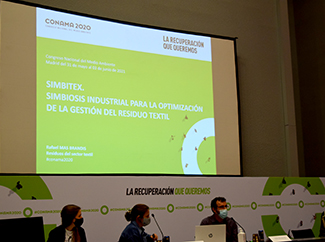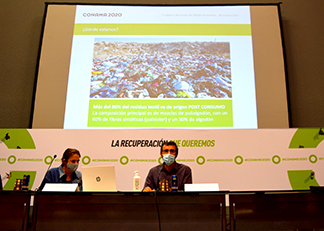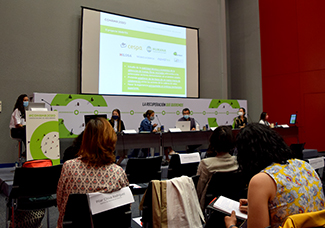consent_cookie
Duración: 1 year
Stores the user's cookie consent state
02-06-2021
The textile industry is facing a great opportunity and a world of possibilities to advance in sustainability, resource management and positive transformation. The development of various R & D & I initiatives, the roadmap set by the European Union and the imminent regulatory changes that are approaching as a result of the Waste and Contaminated Soil Law - in full parliamentary processing - represent three of the pillars on The articulate these advances.
This morning an interesting session was held in Madrid within the framework of the CONAMA National Environmental Congress under the title of "Waste from the textile sector." This session began with the round table ‘Sustainable innovation in the textile sector’, in which Rafael Mas, Director of Projects and External Relations of Humana, spoke.
Mas has presented the Simbitex industrial symbiosis project, financed by the Catalan Waste Agency, and developed in collaboration with CESPA GR (Ferrovial Group). Using Simbitex, the flow of used clothing destined for recycling and downcycling was analyzed in order to design a process to optimize its recovery in the closest area, in this case, in Catalonia.
The conclusions of the project indicate that the mechanical recycling of post-consumer textiles is feasible from a technical point of view, following this scheme
It is not feasible, on the other hand, from the economic point of view, since the resulting recycled yarn is more expensive than the newly manufactured yarn: for an average weight per garment of 300 grams, the extra cost that each article made with post recycled yarn would have consumption is between 0.20 and 1.13 euros.
In the round table, moderated by Irene Díez, Director of the Ecoalf Foundation, the following have participated:
Debate on the application of extended producer responsibility in the textile sector
This was followed by the second part of the session, which included an exciting one on the application of extended producer responsibility in the textile sector and the constitution of a SCRAP.
During the debate, elements such as deadlines, European objectives and the convenience of disaggregating reuse recycling objectives, regulatory development, environmental taxation, discharge rates, finalist taxes, internalization of environmental costs by producers, the maximum of 'who pollutes pays', the role of the current waste managers, the role of the central administration, the Autonomous Communities and the Town Councils –as competent bodies in waste matters-, green and sustainable public procurement, reserved tenders or traceability, reliable statistics on the volume of waste generated each year.
These are the people who have led the responses on the hot topics raised:


